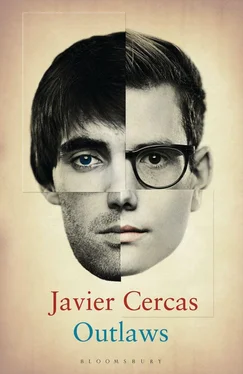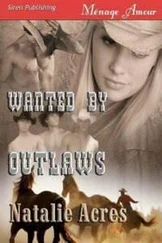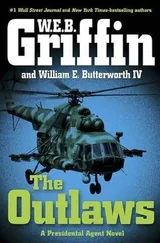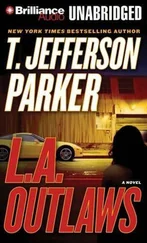‘You didn’t talk about the matter again?’
‘No.’
‘And neither of you mentioned the Liang Shan Po again?’
‘Not that I recall.’
‘And Tere? You haven’t even mentioned her today.’
‘She hasn’t come up. What do you want me to tell you? That summer we saw each other quite often. Tere had lived in Barcelona for a while but the last two or three years she’d moved back to Gerona, or rather to Salt, where she had a job cleaning various council properties. She’d given up her nursing studies and was going out with the local librarian, a guy with a ponytail and a goatee who went everywhere on his bicycle, spoke Catalan-inflected Spanish and rented an allotment on the banks of the River Ter where he grew tomatoes and lettuces. His name was Jordi and he was ten years younger than Tere. We got along well immediately (as far as he was concerned I was just Zarco’s lawyer, and Zarco was just Tere’s famous, unruly relative), so some Saturdays I’d show up at the allotment and spend the afternoon watching him and Tere working the land, talking politics (he was a separatist) or about Salt (he’d been born there and hoped to die there, though he’d travelled all over the world) and having the odd toke of his marijuana; when it got dark we’d go back into the city, them on their bikes and me in my car, and have something to eat at Jordi’s place or in some bar in the old quarter.
‘Sometimes, not many times, Tere and I would meet on our own. For this I would have to invent some important matter to do with Zarco, which was not at all easy. I remember one Saturday I’d met her at midday in a bar in the Sant Agustí Plaza and, after we finished our coffee and dealt with my bullshit, I accompanied her to the farmers’ market they have every weekend on the boardwalk between La Devesa and the banks of the Ter; and I remember while Tere was doing her shopping I thought I might lay a trap for her and suggest crossing the river over to the ground where years before the prefabs had stood. Have you ever been back? I asked. No, she said. It doesn’t look anything like it used to, I told her, and then went on to describe the immaculate park of freshly mown lawns, with brand-new wooden benches and swings and slides that had replaced the lines of miserable barrack huts crisscrossed by streams of pestilential water swarming with flies where she had lived, until I noticed she was looking at me strangely. And if it doesn’t look anything like it used to what do I want to see it for? she asked curtly. That’s how Tere was then: invulnerable to the lures of nostalgia, reluctant to talk more than necessary about the past we shared. Even so, one of those Saturdays we met to talk about Zarco she suggested a café in Santa Eugènia, and when I got there I found her with a large woman who greeted me with a big kiss. Don’t you know who I am? she asked. I had trouble recognizing her: it was Lina. She was still just as blonde as she had been in La Font days, but she’d put on twenty-five or thirty kilos, looked very much worse for wear and shouted when she talked. She didn’t say a word about Gordo, but told me she’d married a Gambian, that she lived in Salt too, that she worked in a hair salon and had three kids. It was an odd encounter. Tere and Lina had never completely lost touch although it had been a while since they’d seen each other, and at some point Lina started talking about Tío, who apart from us was the only member of Zarco’s gang still alive: it seems she’d bumped into him by chance not long before, at the Trueta hospital, and she told us he was getting around in his wheelchair and she’d been really happy to see him (and him to see her); finally she suggested the three of us go visit him in Germans Sàbat, where he still lived with his mother. Tere and I agreed to her suggestion, and we arranged to meet the following week at the same time and in the same place to go together to Tío’s house. But the following Saturday I didn’t show up to meet them; days later I found out that Tere hadn’t shown up either.
‘More or less around the middle of October I stopped seeing Tere and Jordi, not for any reason; Tere simply stopped calling me and I was starting to get the impression that, after the novelty of the first few months, my company was starting to be annoying and they’d rather be alone. The fact is I didn’t see Tere again for almost three months. This time it was by chance. That afternoon I’d gone to La Bisbal to visit a client, at dusk I was returning to Gerona and as I drove into the city by Pont Major I recognized Tere in a group of women and children waiting for a bus at the stop closest to the prison, sheltering from the cold under a little roof. It was Sunday, the last Sunday of the year. I stopped the car, waved to Tere, offered to give her a lift home. Tere accepted, got in beside me and, as soon as we pulled away from the bus stop, told me that Zarco was in very bad shape, that both Friday and Saturday he’d had a fever and that morning they’d diagnosed him with pneumonia. A bit surprised, I said I’d seen Zarco on Wednesday and he hadn’t said anything and I hadn’t noticed anything either; I asked: Did you see him? Tere said no, but she’d been able to speak to the senior supervisor. They were thinking of taking him to hospital, she said. Which hospital? I asked. I don’t know, she answered. I took my eyes off Pedret Avenue for a moment and looked at her. Don’t worry, I said. Tomorrow I’ll talk to the superintendent. And I added: I’m sure it’s nothing. The conjecture filled the car like an unavoidable lie as we approached the city, which at that hour, covered in Christmas lights, sparkled in the distance. To dispel the silence I asked after Jordi. Tere told me distractedly that she hadn’t been seeing him for a while; I waited for an explanation, some comment, but neither was forthcoming, and I didn’t want to keep asking.
‘Tere’s house was on the outskirts of Salt, near the overpass and the highway to Bescanó, in a tower block planted in the middle of a dirty site covered with rubble and weeds. I stopped in front of the building and again promised Tere that I’d talk to the prison superintendent the next day; Tere nodded, asked me to please do that and said goodbye, but as she stepped out of the car she seemed to hesitate. Outside the darkness was almost total; the silence too, except for the growl of the traffic coming from the highway. Without turning back towards me, Tere asked: Do you want to come up?
‘It was the first time she’d ever invited me into her home. We went up a stairway with scaly walls lit by fluorescent tubes, and on the way up we crossed paths with two Middle Eastern women with their hair covered by scarves. When we went inside her apartment Tere ushered me into a tiny dining room, turned on the gas heater and offered me tea or camomile tea. I said I’d have camomile. While Tere made the tea I noted the underprivileged order that reigned in the room: there was nothing but a table with two chairs, an imitation-leather armchair, a sideboard, a small CD player, a portable television and the heater; there were also three open doors leading off the dining room: behind one of them was the kitchen where Tere was bustling, behind the other two I glimpsed or imagined a bathroom and bedroom even smaller and icier than the room I was in. Distracted by that inventory of misery, without realizing it I lost the joy I’d felt at the news that Tere had split up with Jordi, and felt overwhelmed with sorrow at Tere’s life in that lonely outlying flat, sorrow at the news about Zarco’s health, sorrow of the season and Sunday night sorrow.
‘That night Tere and I slept together again. First thing the next morning, instead of going to the office, I went to the prison. At the entrance I was told I couldn’t see Zarco because he’d been admitted to the infirmary. Then I tried to see the superintendent and, after being kept waiting for several minutes, went into his office. I asked him straight out how Zarco was doing. By way of reply the superintendent dug a sheet of paper out of the mess of papers on his desk and handed it to me. And what does this mean? I asked, waving the paper around after I read it. It means that, according to the doctor, Gamallo probably won’t come out of this one, the superintendent answered. Can’t they do anything else? I asked. Aren’t they going to take him to hospital? The superintendent made a gesture of indifference or discouragement. If you want we’ll take him, he answered. But the doctor advises against it. Gamallo isn’t well enough to be moved, and we’re taking good care of him here. Can I go in and see him? I asked, handing him back the paper. I’m sorry, said the superintendent. No visitors are allowed in the infirmary. But I repeat you shouldn’t worry. Gamallo is well attended. Besides, you know doctors: they always say things are worse than they are. Who knows if this one might not be wrong.
Читать дальше












